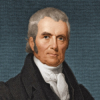John Marshall

John Marshall
John Marshallwas the fourth Chief Justice of the Supreme Court of the United States. His court opinions helped lay the basis for United States constitutional law and many say made the Supreme Court of the United States a coequal branch of government along with the legislative and executive branches. Previously, Marshall had been a leader of the Federalist Party in Virginia and served in the United States House of Representatives from 1799 to 1800. He was Secretary of State under...
NationalityAmerican
ProfessionJudge
Date of Birth24 September 1755
CountryUnited States of America
Whether a law be void for its repugnancy to the Constitution, is, at all times, a question of much delicacy, which out seldom, if ever, to be decided in the affirmative, in doubtful case. ... But it is not on slight implication and vague conjecture that the legislature is to be pronounced to have transcended its powers, and its acts to be considered as void. The opposition between the Constitution and the law should be such that the judge feels a clear and strong conviction of their incompatibility with each other.
A constitution is framed for ages to come, and is designed to approach immortality as nearly as human institutions can approach it.
No political dreamer was ever wild enough to think of breaking down the lines which separate the States and compounding the American people into one common mass.
The peculiar circumstances of the moment may render a measure more or less wise, but cannot render it more or less constitutional.
State inspection laws, health laws, and laws for regulating the internal commerce of a State, and those which respect turnpike roads, ferries, &c. are not within the power granted to Congress. ... Inspection laws, quarantine laws, health laws of every description, as well as laws for regulating the internal commerce of a State, and those which respect turnpike roads, ferries, &c., are component parts of this mass. No direct general power over these objects is granted to Congress, and, consequently, they remain subject to State legislation.
I fear we may live to see another revolution.
Courts are the mere instruments of the law, and can will nothing. When they are said to exercise a discretion, it is a mere legal discretion, a discretion to be exercised in discerning the course prescribed by law; and, when that is discerned, it is the duty of the Court to follow it. Judicial power is never exericised for the purpose of giving effect to the will of the Judge; always for the purpose of giving effect to the will of the Legislature; or, in other words, to the will of the law.
It is the peculiar province of the legislature to prescribe general rules for the government of society; the application of those rules to individuals in society would seem to be the duty of other departments.
I have always believed that national character... depends more on the female part of society than is generally imagined. Precepts from the lips of a beloved mother... sink deep in the heart, and make an impression which is seldom entirely effaced.
The French Revolution will be found to have had great influence on the strength of parties, and on the subsequent political transactions of the United States.
When a law is in its nature a contract, when absolute rights have vested under that contract, a repeal of the law cannot divest those rights.
This government is acknowledged by all, to be one of enumerated powers.
Have no power, by taxation or otherwise, to retard, impede, burden or in any manner control the operations of the constitutional laws enacted by Congress.
What is it that makes us trust our judges? Their independence in office and manner of appointment.